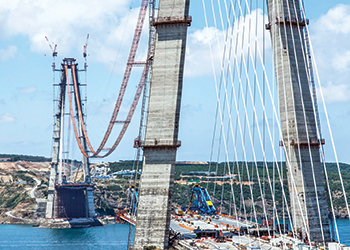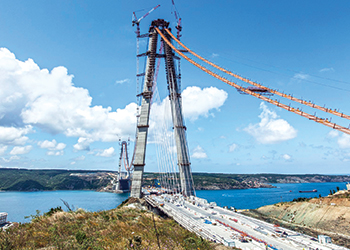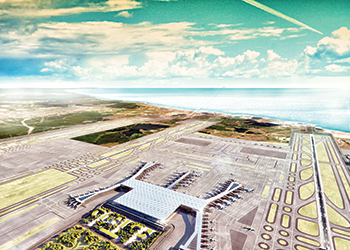
 The third Bosphorus Bridge has the highest concrete bridge piers in the world.
The third Bosphorus Bridge has the highest concrete bridge piers in the world.
Building on its huge potential, Turkey is boosting its infrastructure network to cater to the demands of its growing cities and the rising number of investors and visitors.
Despite the many risks to stability including the spillover of the conflict in Iraq and Syria into the country, Turkey has been one of the best performing emerging markets and holds immense potential for growth.
The nation has been attracting significant investment in recent years, particularly in its real estate sector. Last year, real estate activities accounted for 9.8 per cent of the GDP (gross domestic product) at current prices, having been the third largest contributor to the economy after manufacturing (15.8 per cent) and wholesale and retail trade (12 per cent), according to the Turkish Statistical Institute (Turkstat).
Recent figures from Turkstat also reveal a surge in overseas investors in Turkey’s real estate in May this year, with an increase of 23.1 per cent compared to the previous year – Istanbul alone recorded a whopping 56.7 per cent increase over the period in 2014.
The country is also seeing a growth in tourist numbers, as “instability is affecting many of Turkey’s regional tourism rivals, such as Egypt and the rest of North Africa”, says the BMI Research in its latest report on Turkey, adding that it expects to see strong expansion in the hotel sector across the luxury, mid-range and budget markets as a result of a boost in arrivals.
A key area targeted by Turkey is medical tourism, with three major healthcare public-private partnerships (PPPs) currently being pursued. These include the $1.37-billion Bilkent Integrated Healthcare Campus, which is claimed to be the world’s biggest greenfield hospital project covering an area of more than 1.2 million sq m just outside Ankara.
Turkey’s track record over the last decade has encouraged the government to set highly ambitious growth targets for the economy, says the Oxford Business Group in its 2015 report on Turkey. Between 2014 and 2023, the government is working to boost GDP from around $800 billion to $2 trillion; GDP per capita from $10,400 to $25,000; and total exports from $157.6 billion to $500 billion.
The country’s thrust in recent years has been on construction and infrastructure, which has seen the launch of big-ticket projects such as the ambitious new airport in Istanbul, which stands at the confluence of two continents.
The strategic location of the Turkish commercial capital has also meant that it has been plagued by traffic congestion, which has necessitated immediate attention to its transport infrastructure. Ongoing projects to address this issue include the Eurasia Tunnel and Northern Marmara Highway project including the third Bosphorus bridge, while a $3.5-billion three-level sub-sea tunnel under Istanbul’s Bosphorus Strait has been proposed.
To meet the demands of its rapidly growing cities, Turkey has plans to add more than 600 km of metros to its current 150 km network by 2019.
Given the focus on infrastructure, growth in Turkey’s construction sector is set to be positive with predictions for this year’s real growth put at 4.8 per cent, according to the BMI report. It forecasts an annual average construction industry real growth over its 10-year forecast period of 4.6 per cent.
 |
|
The third Bosphorus Bridge ... part of a |
Key projects
Northern Marmara Highway: This new highway located in northern Istanbul will be 115 km long and includes the third bridge over the Bosphorus that is currently under construction. On completion, the highway is expected to reduce the traffic in the other two highways and bridges that link the two sides of the city – which means less traffic in the city centre. The new highway will be operated by IC Ictas-Astaldi JV companies for about 10 years and then will be transferred to the Ministry of Transportation.
The project has now suffered yet another setback with a tender for the link roads within the scope of the project having been postponed yet again, “as the interested parties need more time to finalise their proposals”, according to the General Directorate of Highways.
The tender for the construction of the Kurtköy-Akyazı section, which had earlier been scheduled for June 30, has been postponed to August 31, while the tender for the Kınalı-Odayeri section, which was due to be held on July 7, has been postponed to September 7, it said.
The third Bosphorus bridge is targeted for completion by the end of this year. IC Ictas Construction Company, which is building it, said the structure will be the widest (59 m), longest (1,048 m) and highest (320 m) bridge in the world.
The bridge and its connecting highways are expected to cost Turkey around $3 billion. The construction began in 2013 and its two towers the Asian Tower and European Tower have been completed. As of May, the Asian tower had risen 318 m high from the ground, while the European one reached 322 m.
Eurasia Tunnel Project: This 14.6-km project linking Kazlıçesme on Istanbul’s European side and Göztepe in Asia is reported to have reached the last laps of construction according to a senior official.
All the land tunnels and some 2.5 km of the 3.4-km section of the subsea tunnel under the sea have been finished, he said.
The project, also known as the Istanbul Strait, is set to open next year.
Istanbul New Airport: Designed to replace the existing Ataturk Airport, this state-of-the-art airport will have the largest terminal under one roof of any airport. Under a recent agreement, Incheon International Airport Corporation and Copenhagen Airports International, a subsidiary of Copenhagen Airports, will act as operational consultants for the next five years to IGA Havalimani Isletmesi (IGA), which will build and operate Istanbul’s new €10.2 billion ($11.1 billion) gateway to the world.
The airport is scheduled to open in 2017.
Subsea tunnel: Turkey is planning an estimated $3.5-billion three-level sub-sea tunnel under Istanbul’s Bosphorus Strait, which will connect the city’s two sides, cutting travel times to 14 minutes.
The 6.5-km-long Grand Istanbul Tunnel, which is described as the first of its-kind in the world, comprises one rail system between two highways for motor vehicles 110 m under the Bosphorus Strait.
The Bosphorus Bridge, the Fatih Sultan Mehmet Bridge and the Yavuz Sultan Selim Bridge (the third Bosphorus Bridge) will be connected to each other once the tunnel is completed. The tunnel is to be integrated into nine railed systems and connected to the Marmaray line, and will link Istanbul’s three airports and nine rail systems with land routes. Tenders for the built-operate transfer (BOT) project are due shortly to put the tunnel into service within five years.





















_0001.jpg)


.jpg)
















.jpg)








.jpg)



